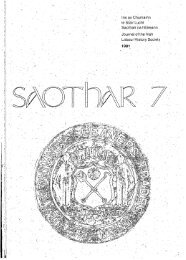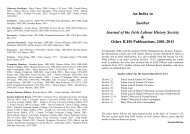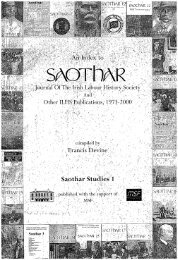You also want an ePaper? Increase the reach of your titles
YUMPU automatically turns print PDFs into web optimized ePapers that Google loves.
110Christopher Norton, Unionist PolitiCs" the BelfastShipyards and the Labour Movement In the IilterWar period, (PhD, Queen's Univeristy, Belfast, 1987)This thesis looks at developments within Unionistand Labour politics in Ulster during the period 1920 tothe early 1930's. In particular it seeks to explain whythe Protestant working class accepted the leadership ofa politically conservative Unionist Party, why it supportedthe Northern Ireland State, and why it rejectedindependent socialist politics. These actions have, innumerous accounts of Northern Ireland's Labour history,been characterised as 'irrational' or 'reactionary'and have been explained in terms of 'manipulation','privilege', 'sectarianism' or through the' notion of the'labour aristocracy'. Rejecting these forms ofcharacterisationand blanket explanation as empirically unfounded,this thesis undertakes a detailed analysis ofwhat is generally accepted as the most politically significantsection of the Protestant working class: theBelfast shipyard workers. The thesis emphasises theheterogeneous nature of the workforce which is shown'" SAOTHAR 13.to be not only occupationally but also politically andideologically baSed. It also outlines withm the shipyardworkforce, the existence of two contrasting and competingpolitical and ideological traditions which can bedesignated 'sectarian' and 'labour and trade union'.The dominance of sectarian ideological traditions andpolitical practices in the shipyards of 1920 (most visiblydemonstrated in the July expulsions of that year)and their effects on the workforce and on the Unionistpolitical leadership are dealt with at some length. Thethesis also examines how the policies of the NorthernIreland State, after its establishment in 1921, wereaffected by Protestant middle class and working class. non-sectarian traditions.This appreciation of the complexity of Unionistpolitics allows for a greater understanding of Governmentpolicy decisions of the time and the divisions thatthey caused within the State. Finally the thesis analysesthe political organisations of the Left in order to determinethe reasons for their failure to attract appreciableworking class support ..POSTAL AND TELECOMMUNICATIONWORKERS' UNIONThe Executive Committee of the Postal and TelecommunicationWorkers' Union extends fraternal support to the IrishLabour History Society in the important task of developing anunderstanding of Irish working class history.PTWU is affiliated to the Irish Congress of TradeUnions, theLabour Party and the Postal Telegraph and Telephone International.The Union's monthly organ is The Postal Worker.PTWU Head Office: 52, Parnell Square, Dublin 1.





